
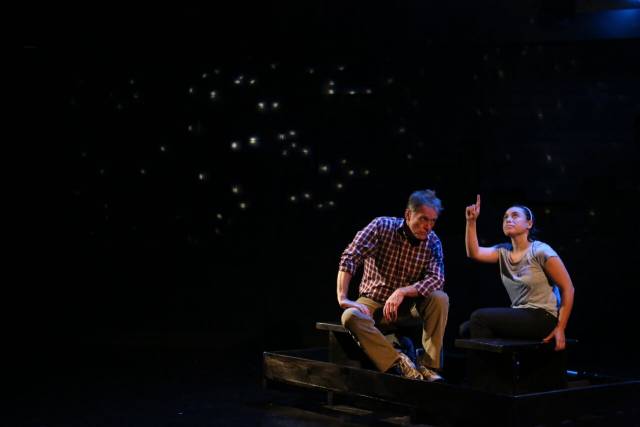
Ensemble Studio Theatre's 35th Marathon of One-Act Plays is nearing the finish line with the opening of its third and final Series, C, last week. This leg of the race is just as varied and interesting as its predecessors, featuring CD store employees at the end of days, some unconventional parent-child bonding, a surprising meet-cute and even some 18th-century Japanese courtesans. I chatted with the playwrights over coffee.
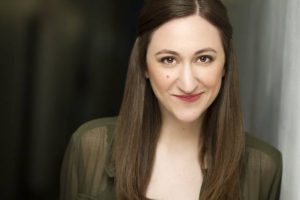 Your play revolves around a yearly ritual shared between a father and daughter. Are there any rituals or moments from your own life that you were remembering while writing?
Your play revolves around a yearly ritual shared between a father and daughter. Are there any rituals or moments from your own life that you were remembering while writing?
Darcy Fowler: I got the idea because my family had a summer tradition where for a week we would rent out my dad’s friend’s cabin—Noel—we would call it Noel’s cabin and my dad would take me out in a canoe at night and teach me about the stars. So that was the initial inspiration... And then there was something about that moment—I remember having that moment at around 21 where I really saw my parents for the first time as a human and a person that’s sacrificed all this stuff for me. And I remember that moment when my parents saw me as an adult—and thought of me as a teenager who’s grown into an adult. And so that’s what the inspiration was. A father and a daughter seeing each other for the first time in certain ways.
So it's pretty much the same ritual, then! You absolutely get that sense of realization. Every time we see your actors--each vignette is a year or so removed from the last--we see them differently, too. They change. What was it like to watch that transformation?
It was a really incredible collaboration. Emma [Galvin, who plays Maddelyn] and Michael [Cullen, who plays Tom] are so good at acting… and they understand things so quickly and they know how to play too, so as soon as we started rehearsing it they brought so much to the table. And then Linsay [Firman] is such a brilliant, sensitive, detailed and aware director. The way she helped these actors craft each vignette was just incredible to watch. And she knew when to let them play and knew when to come in and hone a little bit here and there. Everyone really knew from the beginning what the play was about and how to approach it. It’s one of those things that even though I’m an actor when I watch them act I’m like, “how the eff are they doing that? How can anyone ever act. What the hell.” That’s all.
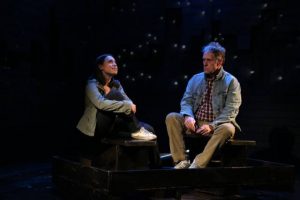
It's a great collaboration. Especially because you are an actor as well as a playwright and Linsay, in addition to directing, is a dramaturg and a Literary Manager. You both understand how to work it from just about every angle.
Linsay has such an awareness of how to get to the heart of a piece. This incredible emotional awareness and she knows how to get to it in just the right way so it’s not too sentimental, but it’s not too dry. The four of us all work really well together in the room. And because this was originally a Brunch piece from a few years ago, so we had all done the scene before, it was kinda like coming back to an old friend and rediscovering the old friend, and me doing some little rewrites that make the old friend clearer and stuff.
I didn't know it was a Brunch. For those who don't know, the Brunches are YoungBlood, EST's, under thirty playwright contingents monthly Sunday one-act festival. Always around a theme. What was the theme that time?
It was the Sloan Brunch, the Science Brunch, and basically the Sloan Brunch is a fun one when you’re in Youngblood because everyone writes a Brunch and they pick five, so everyone’s really trying to figure out a story, And it’s a Brunch where you—it’s the only one—you get paid some good money for [Courtesy of the Sloan Foundation]. So everyone’s like “I gotta think of a Brunch idea." I think the first thing I thought about was the stars and those few trips with my dad and I started thinking about the facts I’d learned about stars and the fact that light is created many, many years before it hits us. And when I thought about that I thought “Oh, this is the perfect parallel to tie into what a father-daughter relationship is." That’s what it started from was that line and then getting into those specifics of what the tradition could be each year.
That is so central to the piece. And when the stars come out, for me, is one of the more gorgeous moments in the whole run.
I felt the same way! It was a really amazing thing going into tech and seeing how our incredible lighting designer [Josh Langman] and sound designer [Julian Evans] and costume designer [Suzanne Chesney], and the boat—the amazing boat they built! How everyone came together and really it’s a piece that when the right technical elements come together it lifts it and it can feel buoyant. I was trying to think of what the worst version of that [effect] could be.
Christmas tree lights?
Yes! or people dressed up as shooting stars and running across the stage.
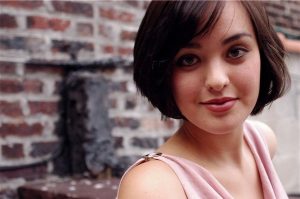 Thankfully, the effect, like all elements of the Marathons Design, was wonderful, especially in Series C, where we not only have Darcy's canopy of stars, but some haiku-spouting cherry trees in Leah Nanako Winkler's Double Suicide at Ueno Park. Leah's play also began as a Brunch piece, but its acceptance to the Marathon meant a definite upgrade.
Thankfully, the effect, like all elements of the Marathons Design, was wonderful, especially in Series C, where we not only have Darcy's canopy of stars, but some haiku-spouting cherry trees in Leah Nanako Winkler's Double Suicide at Ueno Park. Leah's play also began as a Brunch piece, but its acceptance to the Marathon meant a definite upgrade.
Leah Nanako Winkler: It defied my expectations in how beautiful it looks cause I’m sort of used to the slapdash design scheme. This is a high production value comparatively to a Youngblood Brunch, so when I saw the mock ups for the trees I was like "Oh my God, this looks amazing." [In the Brunch] they were on ladders and I was cutting the tissue paper on the floor of the EST office for like, three hours, and the girls were just wearing these pink flowy dresses -- it was still beautiful. And I have kimonos from my grandma so Natalie Kim who played Onoe in the Brunch was wearing a Korean mock up of a kimono. And Jo [Mei, who plays Akemi] was wearing my grandma’s kimono, which was haphazardly tied. It was really nice to see it realized in this form. John [Giampetro, the director] really took my note to bring on the kind of Asian-y stuff and breaking down that stereotype, and I think he really got a lot out of presenting the style and dismantling it a little bit...
That seems key to putting this up. That aesthetic.
I wanted to trick the audience into thinking it was a really Asian-y, stereotypical play at first... But then, I wanted to kind of subvert that expectation, so it’s kind of like a mix between—it’s satirical, but still honest. I basically wanted to crush that question of “oh, here, the Japanese is coming.” I mean, I think it’s naturalism but I’ve been told that it’s weird. But I don’t think that it is. I don’t know. I’m kind of a blunt person...I kind of wanted to show what the outside world sees and then when they talk to each other how alive they are.
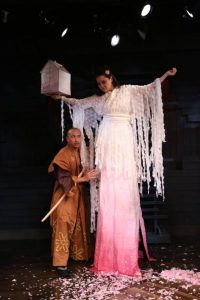
They're very alive. The play seems to be drawing a lot from history while undermining the expectations of a historical piece to be kind of refined. What kind of research did you do and what were you thinking about when writing it?
I’m half-Japanese and I grew up in Japan but I did not go through the Japanese education system properly because I moved to the States when I was five, so I just went to Japanese school on Saturdays and did not pay attention and because I looked so Western the teachers also didn’t take me seriously for some reason. So I didn’t know much about Japanese history and I spent most of my childhood in America wishing that I looked Whiter, y’know, so I could fit in, and the older I got I started wishing that I was more Asian. I’m at a place now where I feel like I’m just mixed and I’m just me. But I have in the last three or our years been delving into Japanese history a little bit more and trying to incorporate that into my writing. I’m technically bilingual and I just don’t have the historical education. The theme for the Brunch was the Period Brunch. Not like in terms of the menstrual cycle, but like a different period. And I was like "I’m really interested in 18th-century Edo Period… And also menstrual cycles."
It has that too.
(Laughs) Yeah. So I wrote a play from research and as I was researching poetry from that time a lot of haikus kept coming up that are referenced in the piece. And I have always really loved cherry blossoms. My fondest memories of Japan are going with my family to watch the cherry blossoms and I go to see them at the Botanical Gardens every year. And I was like, well what if they are in my play and what if they said these haikus? And after researching their beauty and their death I came across the courtesans. And none of the things the courtesans say are ancient Japanese poetry, those go to the trees because I think that trees are very ancient.
And they're in the original Japanese.
They are, there’s some modern poetry in there too.
As we mentioned, there are a lot of great visual and performance moments in the piece. Do you have a favorite?
I think my favorite moment is the cherry tree blossoms. It took us a while to get the shape of the petals right, so I think that looks really beautiful and it’s nice to see.
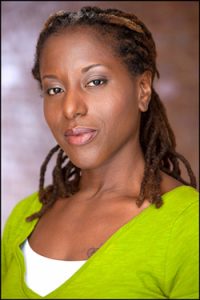 Winkler's play is not alone in its dialogue about identity; France-Luce Benson's The Talk looks at the different cultures of a mother and her daughter.
Winkler's play is not alone in its dialogue about identity; France-Luce Benson's The Talk looks at the different cultures of a mother and her daughter.
France-Luce Benson: A lot of what I write is from being a first-generationer and so there’s a really interesting phenomenon that I’ve observed not just from my family, but most of my friends and relatives that have that same dynamic of in one household you basically have two cultures. It’s not just a generation gap, it’s like I’m American, they grew up in a whole different country, so there are things that I’ve held on to, or culturally we’ve held on to, but we’re also so incredibly different, so that comes up a lot in my work. I’m real fascinated in that for sure.
So the dynamic between Manu and Claire [the mother and daughter] and the ways they respond to, shall we say, intimate topics comes from a real place. As to the initial set up, or 'The Talk' in question: a mother waking her daughter up to talk about a vibrator... please tell me that didn't happen to you.
(Laughs) No, but close! I guess what inspired it was my father has cancer, he’s doing well, it’s been a long time, but a few years ago I was down visiting my parents during Christmas it was holiday time and I was walking through a mall with my mom who I’m not super close with and we don’t talk about personal things. And we’re walking through a very busy, crowded mall and there’s holiday music playing and she turns to me and says: “I want to get your dad to take Viagra, how do you think I could.” And I was like “what?” and I couldn’t escape and it was like, "what’s happening?" And he’d been on a lot of medication and he’d been on Chemo and so his—I can’t believe I’m gonna tell you all this—but it changed his sex drive. And she was just like word vomit. She was telling me every detail of her sex life and wanted to know what to do about it. I wrote the play like a year and a half later, but that moment stuck with me.
Is this your first time presenting this play?
No. It was originally a ten minute play that I wrote for the Fire This Time Festival, and that was in 2013 or 2012. And then Crossroads Theatre in New Jersey was interested in me adapting it into a longer play so that’s how I started exploring how to make it a little bit longer...In the ten minute version we really didn’t get much into what was going on with Claire. It was more of Manu’s story and it very heavily revolved around the vibrator, and so expanding it there was just air. I allowed them to breathe and really talk about how their relationship has evolved over time and what Claire’s journey was. It kind of shifts over to Claire’s journey in this version a bit.
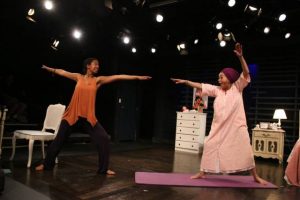
Both your actors deliver. Were they with the play from the beginning?
No.
What did you look for in casting this time?
Lizan [Mitchell], who plays the mother, I had seen recently in Brownsville Song at Lincoln Center. And I had seen her in other things. And I just wanted her. I knew I wanted her. We auditioned a couple of people who were close, but as soon as she came in I knew I wanted her. And when Sharina [Martin] came in we knew. We saw a lot of people for Claire but as soon as she came in we knew. It was hard, we did three days of auditions. And Lizan was MIA and not returning our emails. So the first day we didn’t see anyone that was quite right and we were getting nervous, but Lizan came in and then we read the two of them together and it was no question.
Have you ever done yoga with your mom?
Once.
That's such a great way to end the play though, with Claire coaching Manu.
There’s a moment—I just love Lizan—and there’s a moment when [Claire’s] teaching her the warrior pose. There’s a moment where Clair tells her mom to think of something that makes her happy and Lizan’s smile is so beautiful—I don’t know what she’s thinking about. But I love that moment.
 Winkler, who was in the room said her favorite moment was when Manu unboxes the vibrator. A funny, if uncomfortable bit of business that definitely gets a response from the audience. For Daniel Reitz, who wrote the play Good Afternoon, the response is key.
Winkler, who was in the room said her favorite moment was when Manu unboxes the vibrator. A funny, if uncomfortable bit of business that definitely gets a response from the audience. For Daniel Reitz, who wrote the play Good Afternoon, the response is key.
Daniel Reitz: I like the beginning moments... I like watching the audience being introduced to these two people and to see their reaction.
Given the nature of the beginning of Good Afternoon one could expect the audience to be batting against one of your characters from his first lines, were there difficulties or challenges in writing him?
No. Not about writing about a sex offender. A little concerned maybe that some people in the audience might have a problem with him because of who he is and what he’s done, but I couldn’t really worry about that because I figured the character would speak for himself in terms of who he is and what kind of a person he is. So no, I didn’t worry about it, but I did think about it.
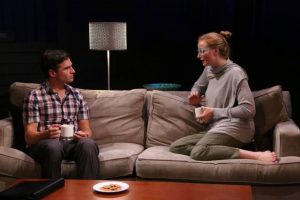
You did a good job challenging our pre-judgments. Haskell King brings a softness to the part of Glen that helps to do that.
I know Haskell and I’ve worked with him. I reached out to him when we were thinking of who would be good for these parts. So he agreed and then we reached out a wider net for the role of Lorrie.
Kerstie Bryan does great and charming work too. Though they are very flawed people.
I didn’t want to write a play about a sex offender with judgment in either direction—I mean, certainly I’m not pro-sex offender, but I think to me it was about the dynamic of the situation. People going door to door, I used to hear about people having to do that and then I just thought, what a ripe kind of idea for a play—a short play. I didn’t really think about the history if there’s a history of that but it just sort of came to me one day that, oh there were people that had to go door-to-door or who have done that or might still some place, and I was thinking about it in terms of these two characters right away and I thought that it was a very potent beginning of the play and where would that go from there.
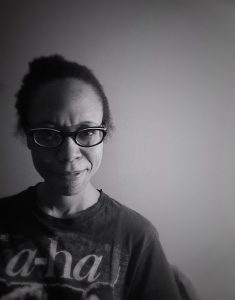 For the pair in Angela Hanks' piece, Devil Music uncertainty looms large. Their CD store's closing -- much like one Hanks knew back in her home town.
For the pair in Angela Hanks' piece, Devil Music uncertainty looms large. Their CD store's closing -- much like one Hanks knew back in her home town.
It’s called—or it was called--CD Source, and it closed its doors March 22nd after 20 years.
And that was in Dallas like Devil Music?
Yes. I grew up in Dallas. I am a Dallasite.
Did you write the play in the wake of that?
It did it before the wake of that. I saw this huge ‘store closing’ sign went up early September while I was home and I went into the store and I think I just decided then while I was at the listening station that this would be a play that I would write.
Did you know the people that worked there?
Not personally. I had always seen the same people over the years. I’d been going to that CD store since I was fifteen, so I always noticed the owner and his wife and the manager of that store, Lance. Lance and Larry.
Music is clearly very important to the piece--and in the script you even have the store playlist included. How did you pick the songs? Did they change?
Kind of curated it to match the length of the play and play with some moments within the play and the undercurrents. I tend to listen to a lot of music when I write in general.
Do the characters JJ and Geraldine have theme music? Billy Ocean's "Get Outta My Dreams" features pretty big.
I don’t think it would definitely apply to both of them. Individually? Do they have a song each? Yes, um I think actually, and this song didn’t make it into the actual store list playlist for the store, is that "Maybe" by The Chantels would be JJ’s.
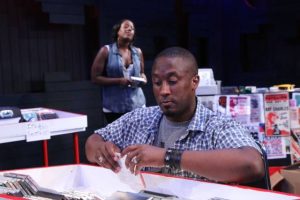
There's almost a musicality in the rhythm of the play, and how your actors, Crystal Lucas-Perry and Daniel Morgan Shelley, play. What was your favorite part of the performance they gave you?
They really invested. Not only to the story but to each other, to Morgan Gould who directed, there’s just a fantastic commitment from both of them.
Absolutely. What part really stood out for you when you see the play on its feet the first time?
I think definitely the Billy Ocean moment.
A great moment we shouldn't spoil here.
And the door moment.
Where they have their heads to the door, of course.
It definitely resonates and it’s definitely one of my favorite moments. And I’m just excited that it worked. And that it had an ultrasonic quality to it that it could translate to the rest of the audience. I was able to see reactions to it and to the play
You can see Series C yourself through June 27th. It's been a pleasure covering these fourteen plays and interviewing fifteen playwrights. Now give them your support and check out their work at EST.
Performances continues through June 27 at Ensemble Studio Theatre.